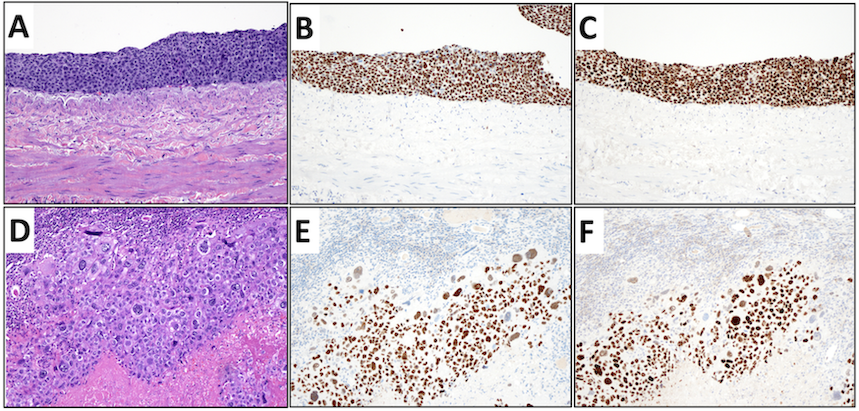Metastatic BK Virus-Associated Urothelial Carcinoma Originating in Renal Allograft
1Pathology, UT Southwestern, Dallas, TX, 2Internal Medicine, UT Southwestern, Dallas, TX
Meeting: 2022 American Transplant Congress
Abstract number: 1504
Keywords: Kidney, Malignancy, Polyma virus
Topic: Clinical Science » Organ Inclusive » 67 - Non-PTLD/Malignancies
Session Information
Session Time: 7:00pm-8:00pm
 Presentation Time: 7:00pm-8:00pm
Presentation Time: 7:00pm-8:00pm
Location: Hynes Halls C & D
*Purpose: Cases of urinary tract carcinoma associated with BK virus have been reported in kidney transplant recipients; therefore, we postulate that BK virus may play a role in oncogenesis.
*Methods: Here we present a report of BK virus-associated urothelial carcinoma originating in the renal allograft with concurrent metastases in multiple sites.
*Results: A 32-year-old male received living related donor kidney transplant in 2007, with baseline creatinine at ~1.7-1.9 mg/dL and an immunosuppression regimen including tacrolimus, mycophenolate, and prednisone. In March 2021, he developed hematuria. Subsequent imaging studies showed a 2.3 cm FDG-avid exophytic mass at the transplant kidney and concurrently, FDG-avid masses in bilateral lungs, lymph nodes, and pancreatic head. Within 3 months, he developed BK viremia (>26,000 copies/mL), which worsened (~38,500 copies/mL) despite immunosuppression reduction. Further immunosuppression reduction and the addition of IVIG and leflunomide showed no improvement. When he developed markedly elevated creatinine (~8 mg/dL), allograft biopsy showed mild acute T-cell-mediated rejection. Further reduction of immunosuppression improved viremia (3,566 copies/mL). CT-guided biopsies of renal allograft mass and lung nodule demonstrated urothelial carcinoma with BK virus positive immunolabeling using SV40 immunostain as a surrogate marker. Transplant nephroureterectomy revealed invasive high-grade urothelial carcinoma with extensive necrosis (~70%), invading renal pelvis and renal parenchyma. Regional lymph nodes were involved by tumor. Both BK virus and p53 overexpression were confined to in-situ (Figure 1, parts A-C) and invasive (Figure 1, parts D-F) urothelial carcinoma and absent in benign urothelium.
$$graphic1
Figure 1. Allograft nephroureterectomy (10x).
*Conclusions: There are some reports of BK virus-associated carcinomas of the bladder and kidney arising in renal transplant patients, however, this case is unique in arising from the allograft kidney and displaying aggressive behavior with locally advanced disease and distant metastases. Furthermore, animal models have shown BK virus to be oncogenic in renal tissue, and proposed this oncogenic model involves T-Ag protein binding to and thus inactivating RB proteins and TP53.
To cite this abstract in AMA style:
Torrealba J, Jones H, Bhakta A, Jia L, Wojciechowski D. Metastatic BK Virus-Associated Urothelial Carcinoma Originating in Renal Allograft [abstract]. Am J Transplant. 2022; 22 (suppl 3). https://atcmeetingabstracts.com/abstract/metastatic-bk-virus-associated-urothelial-carcinoma-originating-in-renal-allograft/. Accessed March 1, 2026.« Back to 2022 American Transplant Congress

